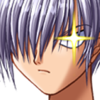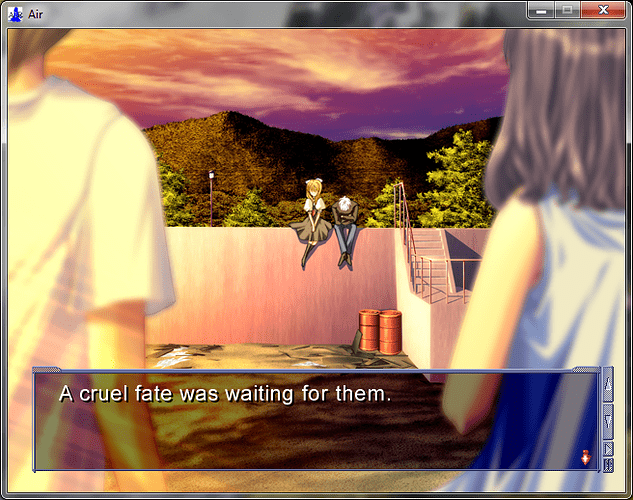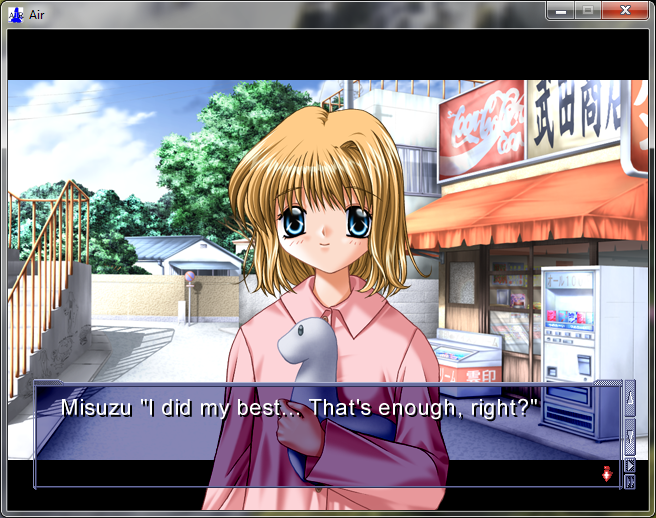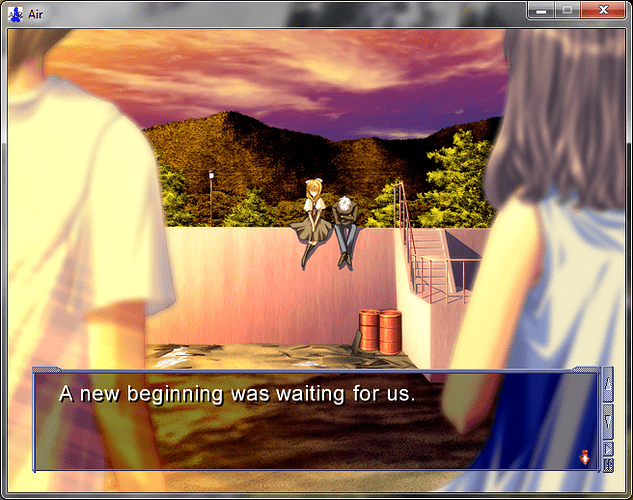Well boys and girls, my personal journey through air has been completed at last. Looking at the chronology of the Key works is interesting for a number of reasons, a large one being the ability to observe how the core arc has developed throughout the years and watching the integration of the story and its arcs into a cohesive being. Kanon’s vn features mostly separate arcs with little overarching story, Air is incredibly interesting as a transitional piece between that style and Clannad, whose style would go on to become the staple for Key even if certain elements were expounded upon.
Air’s core story is amazing. That is to say, the story of Misuzu’s heroine arc, Summer, and AIR work together to form a fantastic overarching narrative. My main flaw with Air is, consequentially, how insubstantial the other two heroine arcs feel by comparison. Kano and Minagi are both entertaining, Kano’s personality and secondary cast making for easily digestible light hearted fun while Minagi told a much more classic emotional narrative about family and the difficulties of moving forward with one’s life–how easy it is to fall into a cycle of regret. However, when paired with the core content of the story, they can not help but feel a little auxiliary and disconnected. This is obviously a problem that would go on to be addressed in all Key works after, tying all of the heroines into the core plot instead of just one.
The absolute highlight, as I have detailed, of the novel was Summer. Summer tells such a complete and emotional narrative that is as filled with hope as it is with grief; it tells a mature story where every step forward is paid for with loss. This really gets at the heart of what I think makes Air such a unique story, esspecially for Key. It’s that element of bittersweetness, that boldness to not create a perfect happy ending. I am one of the heretics that believe Little Busters would have benefited from the less happy, more thematically sound, version of it’s conclusion. Clannad ends on a universally hopeful note and Rewrite, while ever slightly more grey, does mostly the same. Kanon is a bit different given it’s different means od constructing a narrative, but the anime is sure to construct the happy ending that is characteristic of Key’s works.
Air dares to say otherwise. Summer is a perfect tragedy within hope. Kanna is racked with grief and is fated to be cursed while Ryuuya slowly dies and Uraha faces the weight of being the one left behind. However, this is coupled with the persisting hope the Ryuuya and Uraha carry with them until their final breaths that one day the tragedy will end. Air’s ending is beautiful in how it does not wipe away the suffering of the characters thus; it doesn’t invalidate their loss. In the end, Misuzu and Yukito will not, and can not, have a happy ending. However, it is because of their mutual sacrifice that Kanna and Ryuuya can finally find peace, that the cycle can be broken. The suffering of the leads is the price that creates the future. This kind of message, I fear, is not something that we will ever get to see again in a Key work, not since Clannad, Little Busters, and Rewrite have all taken the path of unilateral happiness. Which only goes to make this ending all the more special.
This narrative would, however, be nothing without it’s fantastic thematic backbone. Air is about family, togetherness, and love–specifically maternal love. While Clannad’s text is more explicitly about family, all of the arcs revolve around the struggles within a family, Air does a much better job at constructing a family. By this I mean that the groups introduced in Air go further to replicate the warmth of family. Kano’s arc suffers a lot from lacking a strong thematic backbone, but where it excels is in it’s ability to create that sense of union between Hijiri, Yukito, Kano, and Potato. Minagi does something similar with Minagi and Michoru, albeit not as deftly executed. That said, Minagi’s route was driven with a clear purpose and idea behind it. There was no fluff whatsoever, where Kano’s route was almost all fluff. All of these stories feature a maternal character, be that Hijiri filling in for the memory of the Kirishima mother or Minagi’s actual mother which she must make amends with.
To actually discuss AIR explicitly, Haruko’s growth as a mother herself was the best thing about the route. AIR suffers a bit from repetition bringing down the pace of the story, but AIR is certainly worth it for the last third of the narrative in which Haruko becomes the focus and we get to see the relationship between parent and daughter blossom beautifully. Interesting is how this is not the same kind of thing we later see in Tomoya, even tohugh they may seem similar. By the end it is Haruko’s love, the depth of her devotion for Misuzu, that was powerful enough to draw tears. The beach scene with Keisuke and the scene in which Misuzu walks are fantastic tearjerkers. Keisuke himself is interesting as her seems to serve as a beta Tomoya in terms of his struggle. He isn’t very complex and is honestly kinda shotily written, but he does have moments which resonate for the same reasons that they do in Tomoya.
But this is all besides the point. The best thing about Air and one of the best things I’ve read period is the familial dynamic and love between Kanna, Uraha, and Ryuuya. Nothing has felt more real and natural, developed cleanly over the flow of time, like the bond between those three. It is really sad that Uraha does not get reincarnated as well in the end, but even so the tribulations and sacrifices of these three in the Summer arc are some of my favorite things that Key has ever put out and alone do much to elevate Air to being a fantastic part of the Key legacy.
Ultimately Air is about finding a place to cultivate your happiness, allowing yourself to pursue it. Even if Misuzu and Yukito do not make it through to the end of the story Haruko finds the resolve to move her life forward. Her smiling at the end is exactly what the story needed, the resolve to make the future better.
The story of 1,000 summers has finally come to a close and I am certainly glad I got to experience it.





